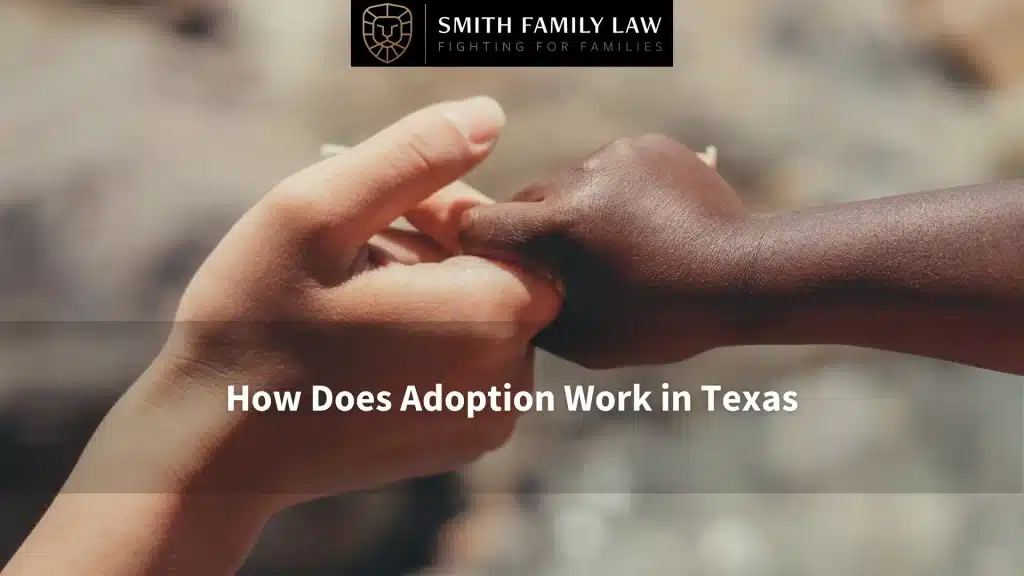
Texas Adoption Laws
Adoption is a lifelong pledge by an individual or couple to care for a non-biological child. The Texas Department of Family and Protective Services (DFPS) provides information for families who want to adopt. A child must live with the adopting family for six months before finalizing the adoption. The adoptive parent(s) submits a Petition to Adopt in the court of the county where the child lives. The adoption is complete once a judge approves the adoption.
However, adopting a child requires more paperwork than just the Petition to Adopt. To adopt a child, you must prove that giving you parental rights serves the child’s best interest. Texas Family Code Chapter 162 identifies specific reports and studies required in the adoption process to help a judge evaluate whether prospective adoption is in the child’s best interests.
In a Texas adoption, officials conduct specific interviews and studies to help the judge decide whether to grant the adoption:
- Personal interviews with each parent, separately, together, or both
- Personal interviews with the child
- Assessment of the child’s relationship and interactions with the prospective parents
- Observing the child in the home environment
- Possible observation of the child in school
- Evaluation of the criminal history of the people in the home the child will live in
- Financial and employment records of the prospective parents
If the child’s potential adoptive parents are not close relatives (grandparent, uncle or aunt, or stepparent), the courts may provide reports to guide the adoptive parents in caring for the child. In addition, reports with information containing the child’s genetic, social, health, and educational history may be provided to the prospective parents if they do not know the child or don’t know the child very well.
Types of Adoption in Texas
An adult begins the adoption process by petitioning the court for permission to adopt an eligible child. You cannot adopt every child. Some common adoption scenarios in Texas include the following:
- Both biological parents have their parental rights terminated or are in the process of terminating their parental rights. In Texas, each biological parent must either consent to relinquish their rights or a lawsuit should support the adoption request. Texas Family Code 162.001(b)(1) covers this.
- Stepparent Adoption. A stepparent can petition the court to adopt the child (biological or adopted) of their spouse. If a biological parent is married to the person seeking to adopt their child, they retain their parental rights. However, before a stepparent can adopt the child, the rights of the child’s other biological parent must be terminated.
- Parental Consent. If a child is over two and one parent has terminated their rights, the other parent can give consent for the child to be adopted by:
- A managing conservator
- The child’s former stepparent
- A person who had actual possession, control, and care f the child for at least six months
- No Parental Consent. If one parent has their rights terminated, a person can adopt a child older than two years if they:
- Is the child’s former stepparent
- Is or has been a managing conservator of the child
- Has had actual control, possession, and care of the child for more than one year before petitioning for adoption
Adoption Agencies in Texas
To fully grasp “how adoption works in Texas,” it’s essential to be aware of the potential financial obligations involved in the process. If you wish to adopt a child that you do not know, such as one where both parents give the child up for adoption at birth rather than raising it themselves, or if you wish to adopt a child in foster care or from abroad, you may choose to work with a Texas adoption agency.
While many adoption agencies are legitimate, there are, unfortunately, some that are less than scrupulous. An Austin family law attorney familiar with adoption agencies in the area can help you evaluate the authenticity of any agencies you might wish to use.
Related Posts:
- Can Single Parents Adopt In Texas?
- How To Adopt My Niece or Nephew In Texas
- What Will Disqualify You from Adopting a Child in Texas?
- Do Foster Parents Get Paid in Texas?
- Can You Adopt If You Have Autism in Texas?
- Understanding the Adoption Tax Credit in Texas
Adoption Costs in Texas

All families may need to pay professional fees, including the costs of home visits or gathering financial and employment documentation, as well as the legal fees associated with the adoption. Although you aren’t required to have a family law attorney represent you in the adoption process, a lawyer’s experience with Texas Family Code statutes concerning adoption and court procedures can help make the process go more smoothly and help you avoid mistakes that can cause costly delays.
The Texas Department of Family and Protective Services (DFPS) offers information about some sources of financial assistance for families considering adoption if the child of the family meets certain criteria.
How Can an Austin Family Law Attorney Help Your Adoption Process?
Adoption paperwork can be intricate, and for those unfamiliar with “how adoption works in Texas,” having an experienced family law adoption attorney from Smith & Bledsoe Family Law can help you understand adoption and your legal obligations in the process. Contact us online or call us at (512) 277-3166 for a consultation with a skilled family law attorney who focuses on Texas adoption.